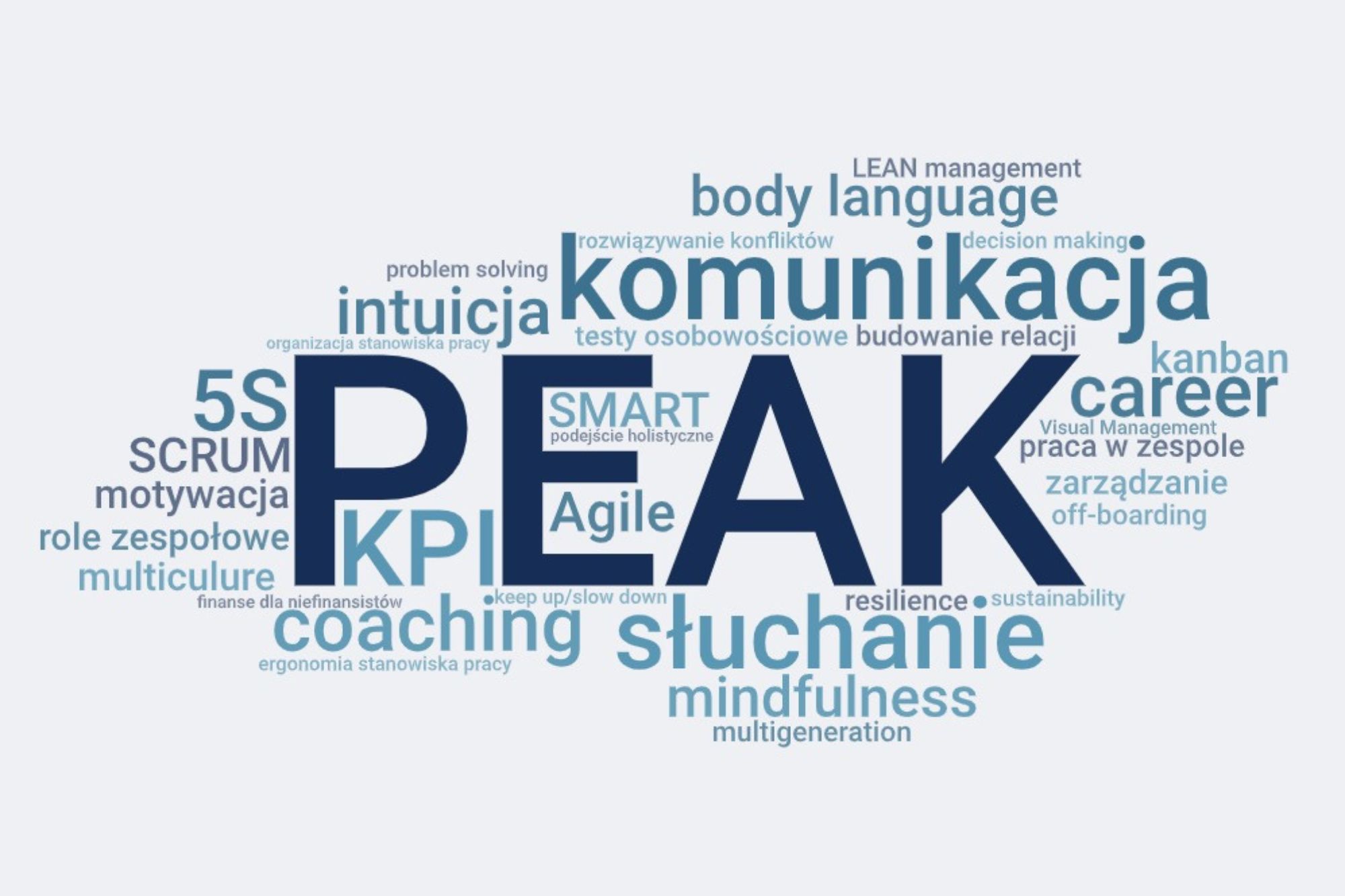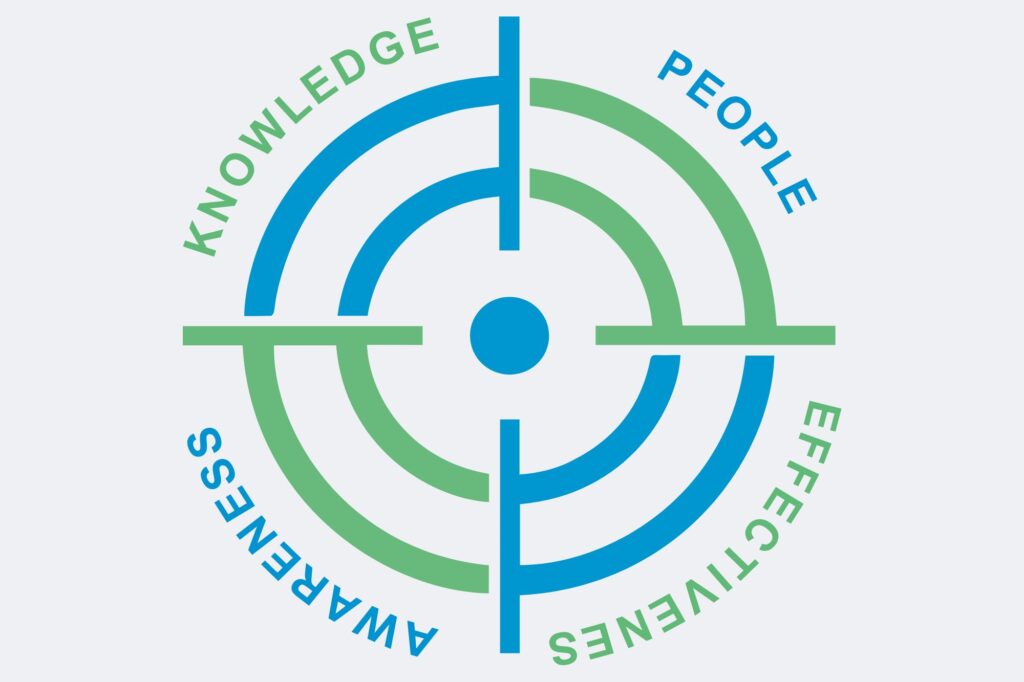
Convince your employer to participate in PEAK
In today’s dynamic and competitive labor market, the role of managers in organizations is becoming extremely important. It is managers who perform a key function in managing, among other things, human resources, physical resources, in leading teams, and in achieving strategic goals. To meet the demands of the modern market, managers must constantly develop themselves – to expand their knowledge, skills, competencies, and leadership abilities. To this end, development programs are being developed, such as PEAK – a certified program for managers.
Spis treści:
- What is a development/training program for managers?
- The role of managers in an organization
- Why invest in manager development?
- PEAK – what is it? Objectives and description of the program
- What will a manager participating in the PEAK program learn?
- Effects and benefits for participants and employers
- Summary
1. What is a development/training program for managers?

A development/training program for managers is a comprehensive action plan that focuses on the individual needs of managers and aims to improve their effectiveness in their management position. It is a structured and purposeful approach to developing the skills, competencies, and leadership abilities of managers in organizations. Development programs often include a variety of methods and tools, including training, workshops, mentoring, coaching, or development projects.
By participating in a development program, a manager can acquire new or expanded knowledge and skills that will significantly help him or her to effectively manage a team, build effective relationships with subordinates, or make sound decisions and achieve better business results.
2. The role of managers in an organization
Managers play a key role in an organization. They perform essential functions, through which they influence many areas of the business, among others:
- Team leadership – managers are responsible for effectively leading a team or teams of employees, they are tasked with motivating, supporting, or supervising them. In addition, they plan, organize, and coordinate the work of the team, while ensuring its efficiency,
- Resource management – they are also responsible for managing the several types of resources that the organization has, including people, time, materials, technology, or budget. They take care of their optimal allocation, utilization, and operation,
- Communication and interaction – play a key role in communication both inside the organization (employees) and outside (customers, suppliers, and other stakeholders). They are tasked with effectively communicating goals, expectations, and information, establishing, and maintaining relationships with subordinates and business partners,
- Problem solving and decision making – at work they often encounter various challenges and problems, their role is to identify them, analyze them, generate solutions, and make sound decisions. They need to know how to resolve conflicts, manage risks, or make decisions based on available information,
- Subordinate development – through training, or regular employee evaluations, managers influence the development of their subordinates’ competencies and skills, which contributes to their productivity and motivation,
- Strategic planning – they also take part in the strategic planning process, determining the goals and strategies of the organization and individual teams.
3. Why invest in manager development?
Investing in the development of managers can increase efficiency and improve the performance of the organization. This is because their development improves the effectiveness of team management, decision-making and problem-solving. Having managers with strong leadership skills is certainly reflected in the business performance of the entire organization. Managers are the backbone of an organization’s leadership team, so investing in their development promotes building a strong and competent team capable of effectively managing the organization, making strategic decisions, and representing the organization externally.
A dynamic business environment requires having managers ready for change and new challenges. Investing in the development of managers, therefore, enables them to acquire new skills and knowledge that are essential in the process of adapting to new, changing market or technological conditions.
Managers who receive professional development opportunities feel valued and are more motivated to achieve further success. In addition, the development of managers can affect talent retention, as employees often remain loyal to an organization that invests in their development and advancement and appreciates their commitment. These organizations build their reputation as an attractive employer.
4. PEAK – what is it? Objectives and description of the program

PEAK is an innovative training program for managers, designed to develop their skills and competencies on various levels. Over a period of 9 months, this intensive program focuses on providing both hard and soft managerial skills to meet the demands of today’s business world.
What sets the PEAK program apart from others is its elevated level of practicality and relevance. Instead of focusing only on theory, the program focuses on the practical side of management, providing participants with concrete tools that they can immediately implement in their daily work. As a result, participants gain not only theoretical knowledge, but also practical skills that are essential for success in a dynamic business environment.
PEAK is an excellent investment in career development. Participants in the program can broaden their horizon, acquire neskills,ls and increase their value in the labor market.
5. What will a manager participating in the PEAK program learn?
PEAK provides the opportunity to learn and benefit from the knowledge and experience of experts who are leaders in their fields. By uniquely combining knowledge of Lean Management tools with the development of soft skills, each module of the program provides practical tips that participants can immediately apply to their work. The PEAK program combines these two spheres to provide a comprehensive and comprehensive approach to the topics.
As part of the PEAK program, participants gain a solid foundation in management tools, such as project management techniques, acquiring data analysis skills and effective decision-making. However, the program is not just limited to technical aspects. It also focuses on developing soft managerial skills, such as communication skills, relationship building, conflict management and leadership.
Through this comprehensive approach, the PEAK program enables participants to broaden their perspective on management challenges and create innovative solutions. Participants gain the ability to analyze problems from different perspectives, enabling them to better understand the context and respond effectively to changing business conditions.
Each module of the PEAK program is optimized to provide practical knowledge and tools that can be directly applied in practice. Participants are provided with specific tips, case studies and interactive exercises that enable them to immediately apply the knowledge they gain in their daily work.
6. Effects and benefits for participants and employers
The PEAK program not only develops participants’ managerial skills, but also inspires them to think innovatively and approach problem solving creatively. As a participant in the program, you can expect many benefits and added value for your career. Career development is an active investment in yourself, both now and in the future. The PEAK program offers concrete and practical management tools that you can directly apply to your work. In addition, it also focuses on developing soft skills, giving you the opportunity to practice them with real-life examples.
The PEAK program takes a comprehensive approach to various aspects of running a business and managing a team. It covers areas such as decision-making, problem-solving, calculating return on investment (ROI) and establishing key performance indicators (KPIs). This gives you the opportunity to expand your skill set and understand the entire management process.
As an employer, by investing in your managers’ participation in the PEAK program, you also gain many benefits. Openness to continually expand knowledge within the organization is becoming a strong asset in today’s rapidly changing business reality. The PEAK program provides concrete and measurable results, preparing your employees for promotion to positions of greater responsibility. In addition, the program can contribute to raising or aligning the competencies of the entire management team, which creates synergistic interaction and helps close competency gaps.
7. Summary
As a result, participating in a certified program for managers – PEAK will bring both you as a participant and your employer tangible benefits. You will develop your skills, gain practical tools and become a more effective manager. At the same time, your company will gain qualified managers who are ready to meet challenges and achieve higher business results in an ever-changing business environment. If you are interested in participating in the program, please visit the PEAK tab on our website for more details. If you have additional questions, feel free to contact us directly by email or phone.

